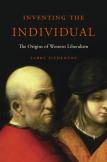Christianity’s Contribution
American ideals of social equality are taken from Greco-Roman political philosophy. Christian other-worldliness caused the fall of the Roman Empire. The form of government favored by the medieval ecclesiastical elite was theocracy. Western individualism originates in the Renaissance.
Each of these claims could be easily imagined as an un-footnoted assertion in a freshman essay or a self-evident starting point in an earnestly historicizing op-ed piece. They are axioms in the popular history of the West. They are also all wrong.
In contrast, Larry Siedentop’s The Invention of Individualism relies on a better history of each underlying topic with the aim of correcting an even bigger whopper. Siedentop’s subject is the development of Western liberalism. By his reckoning, the most formative stage of its development, so quickly situated in ordinary conversation in Antiquity and the Enlightenment, was the Middle Ages. As he artfully but also piquantly puts it, Western liberalism is the natural, even if not the legitimate, child of medieval Christianity. The book is his thoughtful and enjoyable attempt to prove that.
Siedentop, a retired fellow of Keble College, Oxford, and an accomplished historian of 19th-century European political philosophy, argues his case by moving his readers through a series of watersheds. The most important five are these: first, a Greco-Roman notion of justice founded on natural inequality was dislodged by one founded on a Christian notion of moral equality in the writings of St. Paul. St. Augustine pushed this point deeper into the heart of the Christianizing Roman world with his emphasis on the weakness of the human will and the equal subjection of all persons to divine power (contra Pelagius).
A second watershed Siedentop locates with the Carolingians. He argues that the ninth-century emperor Charlemagne’s attempts to form a “Christian people” and his ideals of Christian lordship and “care for souls” laid the groundwork for a later development that grounded rights and responsibilities on a notion of human dignity. The monasticism inspired by the Carolingians, as a place where individual conscience was cultivated, embodied these values best of all and served as a laboratory for their further development.
Third, Siedentop turns to the high medieval popes. Their claims for sovereignty made two key contributions to the West’s incipient liberalism: one, they forged the idea of the equal subjection of the individual to the sovereign, and by the same token ensured limits on the exercise of subjection over the individual. Moreover, the debates over the extent of papal sovereignty established limits on ecclesiastical authority over against secular authority. Theocracy, whether royal or papal, was avoided in principle and in fact.
The fourth watershed is associated with the 14th-century English Franciscan and scholastic philosopher William of Ockham. William’s contribution to the “invention of individualism,” by Siedentop’s lights, is complex. William represents a Franciscan tradition of scholasticism that was skeptical of the Aristotelian project championed by the Dominicans, and thus of reason uncomplemented by the individual’s will. In William’s concomitant defense of conscientious mistakes Siedentop identifies “the birth of liberal secularism.” A further distinction between “mere” and “rightful” power introduced the language of rights into discussions of government and property and so paved the way for a distinction between the state and civil society.
The final watershed is more an anti-watershed as Siedentop “dispenses with the Renaissance” and the axiom that Western individualism was inspired by the humanists.
The attempt to eject an older, malformed, triumphalist history that lionizes antiquity and the Enlightenment as the sources of Western liberalism and civil society and that casts a pall over the intervening years as a dark and totalitarian age is not so new. In any event, Siedentop does not make the claim of novelty for his work, which he describes as synthesizing. Inventing the Individual draws upon much well-established scholarship and is the fruit of Siedentop’s own careful reflection. He could not rely on more eminent medievalists than Brian Tierney, Harold Berman and Peter Brown, whom he explicitly thanks.
His reliance on Fustel de Coulanges, a mid-19th-century historian of the early Middle Ages, and François Guizot, a 19th-century French statesman and érudit, who late in life wrote on contemporaneous Europe’s recent political and revolutionary history, is somewhat more eccentric. Otherwise, his historical grappling with the rise of the individual and of civil society will bring to mind the work of Alisdair McIntyre, Charles Taylor and Jürgen Habermas, even as he arrives at different conclusions. Along these lines, revisionist appreciations of the old periodization have also begun to emerge, Jonathan Israel’s magisterial trilogy on the Enlightenment being the most uncompromising.
Siedentop concludes with a reflection on what he calls a “civil war” in the West over the role of Christianity in the development of Western values. He identifies a kind of European secularist who fails to appreciate the intimately Christian origins of the secular in Western society. One can identify a resonance, even if unintended, of Pope John Paul II’s challenge in “Ecclesia in Europa” that Europe “gives the impression of ‘silent apostasy’ on the part of people who have all that they need and who live as if God does not exist.”
Siedentop writes of course, not as a religious evangelist, but as a historian of ideas. There is, nonetheless, something proselytizing about Inventing the Individual. The reconciliation he calls for between extremes in the secularist and the religious camps over the historical origins of Western liberalism he hopes to catalyze a more persuasive expression of liberalism with worldwide effect. Whether and how this goal is achieved depends, of course, on much more than Siedentop’s single contribution to the project, however literately and enjoyably he has written it.
This article also appeared in print, under the headline “Christianity’s Contribution,” in the August 3-10, 2015, issue.








